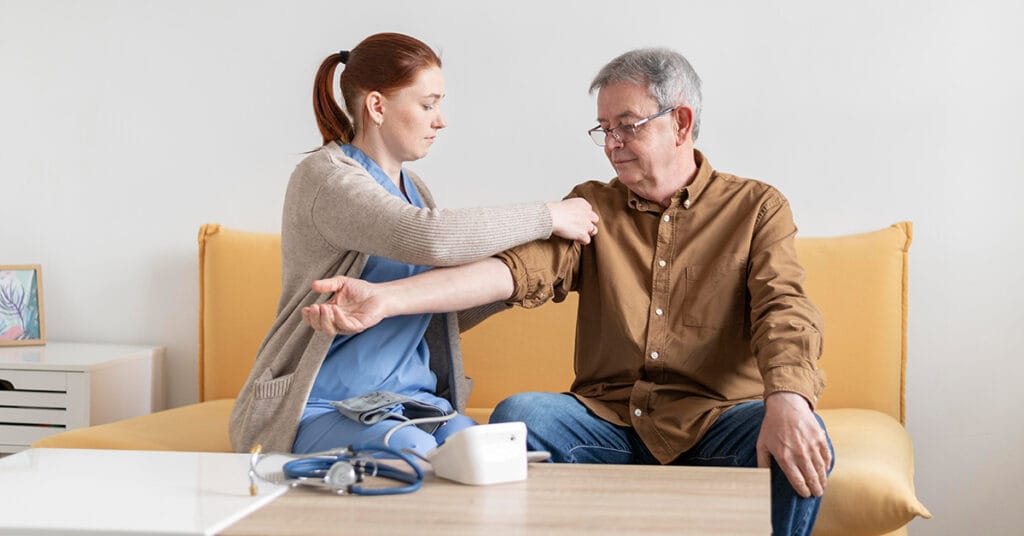Live-in care is a service where a professional carer lives with the individual in their home, providing 24/7 support and assistance. The live-in carer helps with daily activities such as personal care, meal preparation, household tasks, medication management, and companionship. This type of care allows individuals to continue living in the comfort and familiarity of their homes while receiving round-the-clock support tailored to their unique needs.
Unlike domiciliary care, where carers visit periodically throughout the day, live-in care ensures that a carer is always available to assist whenever it’s needed, including during the night. This makes it an ideal option for individuals who require constant supervision or those with complex medical conditions.
Who Can Benefit from Live-In Care?
Live-in care can be an excellent option for various groups of people who need continuous support but wish to avoid moving into a residential care facility. Here are some of the individuals who may benefit most from live-in care:
- Elderly individuals: Older adults who struggle with daily activities such as bathing, dressing, or cooking can greatly benefit from this. It allows them to stay in their own homes while receiving the help they need.
- Individuals with dementia or Alzheimer’s: People with memory-related conditions often find it comforting to stay in a familiar environment. Live-in care ensures they receive personalized support from a carer who understands their condition and can manage the associated challenges.
- Individuals with Physical Disabilities: Those with mobility issues or physical disabilities may require round-the-clock assistance for everyday tasks and can benefit from having a live-in carer to provide constant support.
- People Recovering from Surgery or Illness: After a major surgery or serious illness, live-in care can help individuals recover in the comfort of their own homes while ensuring they receive appropriate medical care and rehabilitation.
- Individuals with Complex Medical Conditions: This can be tailored to support people with chronic conditions such as Parkinson’s disease, multiple sclerosis, or severe arthritis, providing specialized care that addresses their unique needs.
What Does a Live-In Carer Do?
A live-in carer’s duties can vary significantly depending on the individual’s requirements. However, their responsibilities generally cover a broad range of tasks, including:
- Personal Care: Assisting with activities of daily living such as bathing, dressing, grooming, toileting, and hygiene. Personal care ensures that the individual maintains their dignity and well-being.
- Companionship and Emotional Support: Providing companionship to reduce loneliness, engaging in meaningful conversations, and participating in hobbies or activities. A live-in carer can also accompany the individual to social events or medical appointments.
- Household Tasks and Meal Preparation: helping with housekeeping duties like cleaning, laundry, and cooking. A live-in carer can prepare meals that meet dietary needs or preferences, ensuring the individual maintains a balanced and nutritious diet.
- Medication Management: Ensuring medications are taken on time and in the correct dosage. Live-in carers can also help monitor the individual’s response to medication and report any issues to healthcare professionals.
- Specialized Medical Support: Depending on the carer’s qualifications, they may assist with more complex tasks such as wound care, catheter management, or using medical equipment. This is often coordinated with a healthcare professional to ensure proper care.
- Night-Time Assistance: For individuals who have night-time needs, such as getting up to use the toilet or requiring assistance with repositioning in bed, live-in carers are available to provide support throughout the night.

How Does Live-In Care Work?
Setting up usually involves several steps to ensure that the individual receives a service tailored to their specific needs. Here’s a general outline of how it works:
- Assessment of Needs: A care provider will conduct an initial assessment to understand the individual’s needs, preferences, medical conditions, and living situation. This helps to create a customized care plan.
- Matching with a Suitable Carer: The care provider will then match the individual with a live-in carer whose skills, experience, and personality are suitable for meeting the person’s requirements. It’s important that both the individual and their family feel comfortable with the chosen carer.
- Care Plan Development: A personalized care plan is created, detailing the tasks the carer will perform and the support needed throughout the day and night. The plan is flexible and can be adjusted as the individual’s needs change.
- Introducing the Carer: The live-in carer is introduced to the individual and their family, and the care service begins. The carer will typically move into a spare bedroom within the home and start providing the agreed-upon care.
- Ongoing Monitoring and Adjustments: Regular reviews are conducted to assess the effectiveness of the care plan. Adjustments can be made based on feedback from the individual, their family, and the carer.
Benefits of Live-In Care
This type of care offers numerous advantages for individuals who need continuous support. Here are some of the key benefits:
- Comfort of Staying at Home: The ability to remain in a familiar environment can significantly improve an individual’s emotional well-being, especially for those with dementia or cognitive impairments.
- Personalized, One-on-One Care: Since the carer is dedicated to a single individual, the level of attention and support is more personalized than in a care home where staff attend to multiple residents.
- Maintaining Independence: This allows individuals to continue living life according to their preferences, whether it’s maintaining a certain daily routine, eating their favourite meals, or engaging in hobbies.
- Reduced Risk of Infections: Staying at home reduces exposure to infectious diseases, which is particularly beneficial for elderly individuals or those with weakened immune systems.
- Support for Couples: If one partner in a couple requires care, live-in care enables them to continue living together, avoiding the need for separation that might occur if the partner moves into a care home.
- Peace of Mind for Families: Knowing that a loved one is receiving constant, professional support provides peace of mind for family members who may not be able to be present all the time.
Live-In Care vs. Other Types of Care
Understanding how live-in care differs from other care options can help you determine if it’s the right choice for your situation.
Live-In Care vs. Residential Care Homes
- In residential care homes, individuals move into a facility where they receive care alongside other residents. This setting can be less personalized and may lack the familiarity of home.
- Live-in care allows individuals to stay at home, maintaining a level of independence and privacy not possible in residential care.
Live-In Care vs. Domiciliary Care
- Domiciliary care involves carers visiting the home periodically to provide support, which may not be sufficient for those who need constant supervision.
- Live-in care provides 24/7 assistance, making it suitable for those with more intensive care needs.
Live-In Care vs. Nursing Homes
- Nursing homes cater to individuals with complex medical needs who require frequent medical interventions.
- While live-in care can include specialized medical support, individuals who need constant medical supervision might benefit more from a nursing home setting.
Things to Consider Before Choosing Live-In Care
While live-in care offers numerous benefits, there are a few factors to consider before deciding if it’s the right option:
- Space Requirements: The carer will need a private bedroom and access to bathroom facilities. It’s important to ensure the home is suitable for a live-in arrangement.
- Cost Considerations: This is more expensive than domiciliary care due to the 24/7 nature of the service. However, it may still be more cost-effective than moving into a care home, especially for couples.
- Compatibility with the Carer: As the carer will be living in the home, it’s essential to ensure they are a good fit in terms of personality, lifestyle, and approach to care.
Conclusion
Live-in care is a valuable option for those who require continuous support but want to remain in the comfort of their own home. It provides a personalized, flexible, and compassionate approach to care, catering to a wide range of needs from personal assistance to medical support. For families seeking a reliable and comforting solution for their loved ones, live-in care can offer peace of mind and an improved quality of life. If you’re considering this type of care for yourself or a loved one, reach out to us today to discuss your needs and explore how our live-in care services can make a difference.









